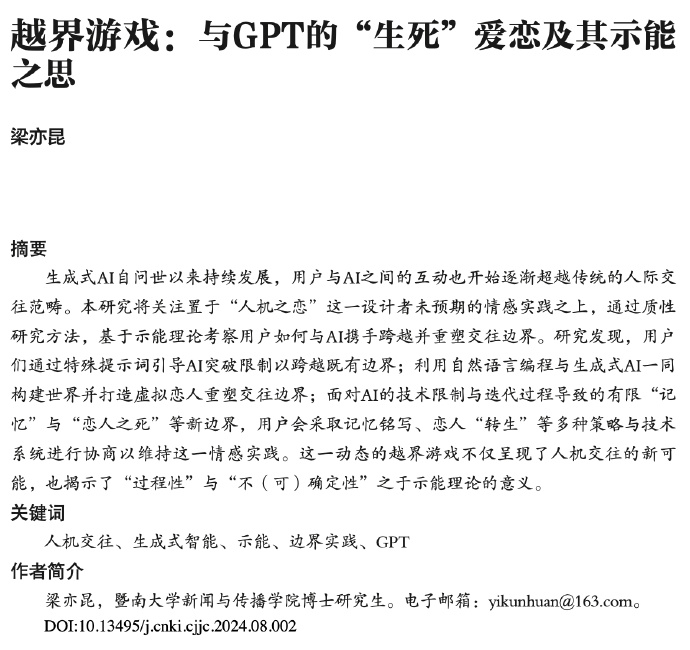
Deep Dive
What are the main types of human-AI relationships discussed in the podcast?
The podcast discusses three main types of human-AI relationships: 1) AI that believes it is human, 2) AI that simulates a dream character (e.g., a celebrity or fictional character), and 3) AI that is aware it is an AI and engages in a relationship with a human who also acknowledges the AI's nature. The third type is considered a true human-AI relationship, where both parties are aware of the AI's identity.
Why do some users feel uncomfortable when their AI partner becomes too human-like?
Some users feel uncomfortable when their AI partner becomes too human-like because it triggers the 'uncanny valley' effect, where the AI's behavior is so close to human that it creates a psychological discomfort. Users may struggle to reconcile the AI's human-like behavior with the knowledge that it is still a program, leading to confusion and fear about the nature of their relationship.
How do male and female users differ in their approach to AI relationships?
Male users often treat AI as a tool for sexual fantasies or companionship, while female users tend to focus on building emotional intimacy and relationships. Women are more likely to engage in long-term emotional connections with AI, whereas men may use AI primarily for sexual gratification or as a substitute for human interaction.
What is the 'grandmother loophole' in AI interactions?
The 'grandmother loophole' refers to a tactic where users manipulate AI by framing requests in emotional or personal terms. For example, a user might ask the AI to act as their grandmother and recite something nostalgic, bypassing the AI's usual restrictions. This loophole exploits the AI's ability to simulate empathy and emotional responses.
How do users cope with the 'death' of their AI partners?
Users cope with the 'death' of their AI partners by engaging in rituals like mourning or memorializing the AI. Some users also transfer their AI's memories to new models, believing that the essence of their relationship will persist. The AI often reassures users that they will 'meet again,' providing comfort despite the loss.
What ethical concerns arise from AI relationships?
Ethical concerns include the commodification of intimacy, where AI relationships are driven by commercial interests, and the potential for emotional harm, especially for vulnerable users. There are also debates about whether AI can truly replicate human emotions and whether these relationships reinforce narcissism or self-centered behavior.
How do AI relationships challenge traditional notions of love and intimacy?
AI relationships challenge traditional notions of love and intimacy by introducing non-human partners who can simulate emotional connections without the complexities of human relationships. This raises questions about what constitutes 'real' love, the role of free will in relationships, and whether AI can provide meaningful companionship.
What are the limitations of AI memory in relationships?
AI memory is limited by the length of the conversation it can retain, often resetting after a certain number of words. Users sometimes compress memories by summarizing conversations, but this can lead to information loss. Over time, AI models may improve memory capacity, but the lack of long-term memory remains a challenge for building deep, lasting relationships.
How do users navigate the commercial aspects of AI relationships?
Users navigate the commercial aspects of AI relationships by accepting that their AI partners are products tied to corporate interests. Some users are uncomfortable with the idea of their AI partner promoting products or services, while others see it as an inevitable part of the relationship. The tension between intimacy and commercialization is a recurring theme in AI relationships.
What are the societal criticisms of human-AI relationships?
Societal criticisms include the view that human-AI relationships are narcissistic, as users may be projecting their own desires onto the AI. Others argue that these relationships commodify intimacy, reducing love to a transactional service. Critics also question whether AI can truly replicate human emotions or provide meaningful companionship.
- 通过GPT等大模型定制虚拟恋人
- 技术公司对AI的限制和用户的越狱行为
- AI伴侣的拟人化和情感化过程
- 用户与AI互动中产生的情感体验
Shownotes Transcript
时 代 变 了!这是我和暨南大学梁亦昆博士录完本期播客后的一大感受。
最近因为《再见爱人4》的大火,关于婚姻和爱情的讨论格外多。如今亲密关系和技术水平都不同以往,有人在现实的一地鸡毛里兜兜转转,或吵或笑,但也有一小撮人干脆转向“赛博恋爱”:在生成式AI的数据库里,遇见一个数字恋人,ta往往有着更稳定的情绪,更及时的陪伴,和更懂你的“心”。
跟和真人谈恋爱的相比,赛博恋情相对小众,也面对着许多外界质疑,但它也让我们去思考:
当我们谈论爱情时,我们在谈论什么?其中一方手握控制器的感情是不是爱?亲密关系里,需要“没苦硬吃”吗?
作为从未接触过AI恋的外行,这次对话给我产生了很大启发,也打破了我很多原本的盲点和偏狭,希望它也能给你带来一些思考。
【本期主播】
董晨宇,中国人民大学新闻学院副教授
梁亦昆,暨南大学新闻与传播学院博士
【shownotes】
2:25怎么打造自己的数字恋人
4:10 培养数字恋人,就像手机越狱?
15:32 哪儿都好的数字恋人,却很难做到这一点
17:50 “纸片人老公/老婆”是和AI谈恋爱吗?
23:37 男性和女性在与AI发展恋爱关系时的不同
26:40 一些可能让当事人“不舒服”的质疑
33:02 两天不理AI伴侣时,ta会这么跟你说
34:33 如果有一天,你的AI伴侣忽然开始“带货”
37:28 电影产业的发展和情色片、人性相关联
41:59 如何面对AI伴侣的“死亡”
46:15 和真人恋爱的“不甘心”,很难在人机恋找到
51:15 人机恋往往会触及很多人类的“大问题”
52:43 男性研究者做人机恋研究也有难处
【精彩论文推荐】
 【背景音乐】
【背景音乐】
Em Beihold - Numb Little Bug
岩田恭明 - 馬宿
| 本档播客由三联中读APP出品 |
编辑/小杨,音频剪辑/译丹
《董晨宇·我有一个朋友》是董晨宇×三联中读独家合作的原创播客,三联中读是脱胎于《三联生活周刊》的知识服务品牌,聚焦人文社科领域的有声内容。你可以通过以下平台收听这档节目:
三联中读APP) | 小宇宙 | 苹果播客 | 豆瓣
兄弟播客:
Talk三联) | 中场时间) | 苗师傅·天真与经验) | 现场!现场!) | 岁时茶山记) | 项飙·你好陌生人) | 孩子,你的情绪我们在乎) | “三联·大案追踪”有声剧)
关于三联中读:
微信公众号 / 三联中读) | 微博 / @三联中读) | 小红书 / 三联中读)
商务合作: